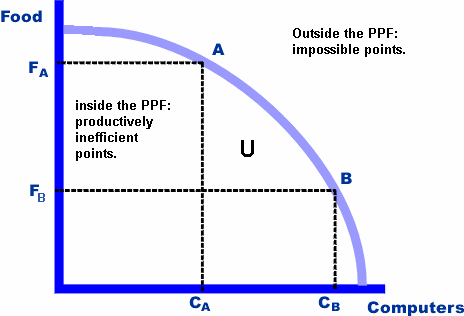Economics is the study of how societies use scarce resources to produce valuable commodities and distribute them among different people. It rests on two notions: (1) goods are scarce, i.e. they are limited relative to the desires and (2) efficiency denotes the most effective use of a society’s resources in satisfying people’s wants and needs à absence of waste. Economists work with a different notion of efficiency, namely “Pareto efficiency“: An allocation is efficient, when it cannot make anyone economically better off without making someone else worse off
Two fields of economics studies
- Microeconomics: branch of economics which today is concerned with the behaviour of individual entities such as markets, firms and households
- Macroeconomics, concerned with the overall performance of the economy
Common fallacies in economic reasoning:
- Post-hoc fallacy occurs when we assume that, because one event occurred before another event, the first event caused the second event.
- Failure to hold other things constant
- Fallacy of composition; assumption that what is true for the part is also true for the whole à e.g. Farmer with bumper crop, he enjoys higher income; all farmers with bumper crop, the income is likely to fall
Positive economics describes the facts of an economy, while normative economics involves value judgements
Ways for answering the three problems of economic organisation
A Market economy is one, in which most decisions about production and consumption are made by individuals and private firms. There exists a system of prices, markets, profits and losses, incentives and rewards determines what, how and for whom. Firms produce the commodities that yield highest profits (the what), by using techniques of production that are least costly (how); consumption is determined by individuals decisions about how to spend the wages and property incomes generated by their labor and property ownership (the for whom). The free interaction of firms supplying and households demanding goods in markets determines the major economic decisions in the society
- Laissez-faire economy: government keeps hands of any economic decision
- Command economy: most decisions about production and distribution are made by the government; government owns most means of production; it owns and directs the operation of enterprises in most industries, it’s the employer of most workers, decides on the distribution of goods
à the government answers the major economic questions through its ownership of resources and its power to enforce decisions - Most societies are thus mixed economies, with elements of market and command.
Economic organization
There are several ways economic activity may be organized:
- Command economy à government makes most economic decisions
- government owns means of production
- directs the productive facilities
- employs most people
- decides how output is to be distributed - Market economy à individuals and private firms make the major decisions regarding consumption and production
- system of prices, which are determined by supply and demand
- production decisions made by firms, that are motivated by profits
- individuals supply labor services (and other means of production) to privately owned firms
- households use earned income to demand goods in consumption markets
- free interaction of firms supplying and households demanding goods in markets determines the major economic decisions in the society
Society’s technological possibilities
Goods are scarce relative to wants, an economy must decide how to cope with limited resources. A socieity must choose between different potential bundles of goods (the what), select from different techniques of production (the how) and decide in the end who will consume the goods (the for whom).
Inputs and Outputs
Inputs (or factors of production) are commodities or services that are used to produce goods and services; an economy uses the existing technology to combine inputs, to produce outputs
can be classified in three broad categories:
- Land : natural resources
- Labor : consists of the human time spent in production
- Capital : forms the durable goods of an economy; they are produced in order to produce yet other goods
Outputs are the various useful goods or services that result from the production process and are either consumed or employed in further production.
Production possibility frontier shows the maximum amounts that can be obtained by an economy, given its technological knowledge and the quantity of inputs available (scarcity). Points inside the PPF are attainable but inefficient, points on the PPF are attainable and efficient, points outside are not attainable

Production Possibilities Frontier - A key economic principle
e.g. PPF of Capital Investment or Current Consumption. A society has to decide on whether to invest in the future or whether to spent everything right away for consumption goods à more investment in capital goods is likely to push the PPF outward
Economic growth entails moving the PPF outward with
… technological knowledge and/or
… the quantity of available inputs
Factors of economic growth
… human resources
… natural resources
… capital formation (productive equipment, infrastructure)
… technology
Trade-off line
PPF shows the notion of trade-offs à a trade-off usually refers to losing one quality or aspect of something in return for gaining another quality or aspect. It implies a decision to be made with full comprehension of both the upside and downside of a particular choice.
Opportunity costs
In a world of scarcity, choosing one thing means giving up something else. The opportunity cost of a decision is the value of the good or service forgone.
Productive Efficiency occurs, when an economy cannot produce more of one good without producing less of another good; this implies that the economy is on its PPF. This shows that productive efficiency is one important aspect of overall economic efficiency
thank you so much for this!
ReplyDelete